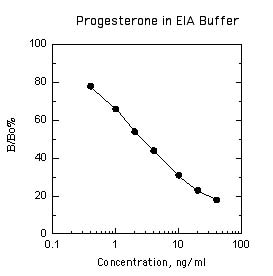Product Overview
Background
Progesterone is a C-21 steroid secreted by the corpus luteum and the placenta. It is an important intermediate in steroid biosynthesis in all tissues that secrete steroid hormones. Progesterone is responsible for the progestational changes in the endometrium and cyclic changes in the cervix and vagina. The plasma progesterone level is useful in investigating the luteal function and monitoring ovulation.
Assay Principle
This is an ELISA for the quantitative analysis of Progesterone levels in biological fluid. This test kit operates on the basis of competition between the hormone conjugate and the Progesterone in the sample for a limited number of binding sites on the antibody-coated plate.
The sample or standard solution is first added to the microplate. Next, the diluted hormone conjugate is added and the mixture is shaken and incubated at room temperature for one hour. During the incubation, competition for binding sites is taking place. The plate is then washed removing all the unbound material. The bound hormone conjugate is detected by adding substrate, which generates an optimal color after 30 minutes. Quantitative test results may be obtained by measuring and comparing the absorbance reading of the wells of the samples against the standards with a microplate reader at 450nm or 650nm. The extent of color development is inversely proportional to the amount of Progesterone in the sample or standard. For example, the absence of Progesterone in the sample will result in a bright blue color, whereas the presence of Progesterone will result in decreased or no color development.
If using urine as a sample it is recommended to run our
Creatinine Assay kit (CR01)
in conjunction with your samples since urinary creatinine levels may be used to normalize the rate of excretion of other analytes.

